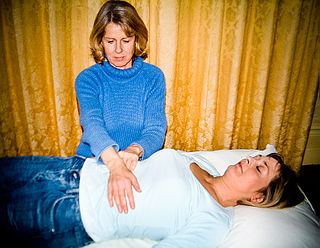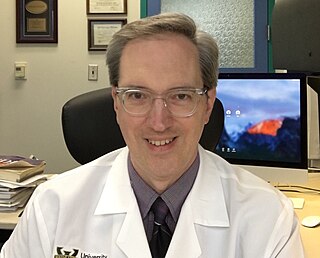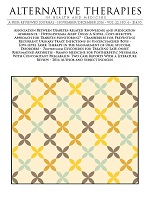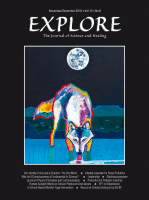Alternative medicine is any practice that aims to achieve the healing effects of medicine despite lacking biological plausibility, testability, repeatability or evidence of effectiveness. Unlike modern medicine, which employs the scientific method to test plausible therapies by way of responsible and ethical clinical trials, producing repeatable evidence of either effect or of no effect, alternative therapies reside outside of mainstream medicine and do not originate from using the scientific method, but instead rely on testimonials, anecdotes, religion, tradition, superstition, belief in supernatural "energies", pseudoscience, errors in reasoning, propaganda, fraud, or other unscientific sources. Frequently used terms for relevant practices are New Age medicine, pseudo-medicine, unorthodox medicine, holistic medicine, fringe medicine, and unconventional medicine, with little distinction from quackery.

Reiki is a pseudoscientific form of energy healing, a type of alternative medicine originating in Japan. Reiki practitioners use a technique called palm healing or hands-on healing through which, according to practitioners, a "universal energy" is transferred through the palms of the practitioner to the client, to encourage emotional or physical healing. It is based on qi ("chi"), which practitioners say is a universal life force, although there is no empirical evidence that such a life force exists.
Rolfing is a form of alternative medicine originally developed by Ida Rolf (1896–1979) as Structural Integration. Rolfing is marketed with unproven claims of various health benefits, is recognized as pseudoscience and has been characterized as quackery. It is based on Rolf's ideas about how the human body's "energy field" can benefit when aligned with the Earth's gravitational field.

Deepak Chopra is an Indian-American author, new age guru, and alternative medicine advocate. A prominent figure in the New Age movement, his books and videos have made him one of the best-known and wealthiest figures in alternative medicine. In the 1990s, Chopra, a physician by education, became a popular proponent of a holistic approach to well-being that includes yoga, meditation, and nutrition, among other new-age therapies.
The National Center for Complementary and Integrative Health (NCCIH) is a United States government agency which explores complementary and alternative medicine (CAM). It was initially created in 1991 as the Office of Alternative Medicine (OAM), and renamed the National Center for Complementary and Alternative Medicine (NCCAM) before receiving its current name in 2014. NCCIH is one of the 27 institutes and centers that make up the National Institutes of Health (NIH) within the United States Department of Health and Human Services.
The Burzynski Clinic is a clinic selling an unproven cancer treatment, which has been characterized as harmful quackery. It was founded in 1976 and is located in Houston, Texas, in the United States. It offers a form of chemotherapy originally called "antineoplaston therapy" devised by the clinic's founder Stanislaw Burzynski in the 1970s. Antineoplaston is Burzynski's term for a group of urine-derived peptides, peptide derivatives, and mixtures. There is no accepted scientific evidence of benefit from antineoplaston combinations for various diseases, and the Clinic's claimed successes have not been replicated by independent researchers. The therapy has been rebranded in various ways over the years to mirror fashions in medicine, for example as a kind of "immunotherapy". The therapy is administered through the ruse of running a large numbers of clinical trials, which long-time Burzynski lawyer Richard Jaffe has described as "a joke".

Robert Todd Carroll was an American author, philosopher and academic, best known for The Skeptic's Dictionary. He described himself as a naturalist, an atheist, a materialist, a metaphysical libertarian, and a positivist. In 2010 he was elected a fellow of the Committee for Skeptical Inquiry. He was a professor of philosophy at Sacramento City College from 1977 until his retirement in 2007.
Anthroposophic medicine is a form of alternative medicine based on pseudoscientific and occult notions. Devised in the 1920s by Rudolf Steiner (1861–1925) in conjunction with Ita Wegman (1876–1943), anthroposophical medicine draws on Steiner's spiritual philosophy, which he called anthroposophy. Practitioners employ a variety of treatment techniques based upon anthroposophic precepts, including massage, exercise, counselling, and administration of substances.
Gary E. Schwartz is an American psychologist, author, parapsychologist and professor at the University of Arizona and the director of its Laboratory for Advances in Consciousness and Health. Schwartz researches the veracity of mediums and energy healing. His mediumship experiments have been described as flawed by critics who have argued that they failed to use adequate precautions against fraud and sensory leakage, relied on non-standardized, untested dependent variables and unaccounted for researcher degrees of freedom.
Functional medicine (FM) is a form of alternative medicine that encompasses a number of unproven and disproven methods and treatments. It has been described as pseudoscience, quackery, and at its essence a rebranding of complementary and alternative medicine. In the United States, FM practices have been ruled ineligible for course credits by the American Academy of Family Physicians because of concerns they may be harmful.

Harriet A. Hall was an American family physician, U.S. Air Force flight surgeon, author, science communicator, and skeptic. She wrote about alternative medicine and quackery for the magazines Skeptic and Skeptical Inquirer and was a regular contributor and founding editor of Science-Based Medicine. She wrote under her own name or used the pseudonym "The SkepDoc". After retiring as a colonel in the U.S. Air Force, Hall was a frequent speaker at science and skepticism related conventions in the US and around the world.

David Henry Gorski is an American surgical oncologist and professor of surgery at Wayne State University School of Medicine. He specializes in breast cancer surgery at the Karmanos Cancer Institute. Gorski is an outspoken skeptic and critic of alternative medicine and the anti-vaccination movement. He writes as Orac at Respectful Insolence and as himself at Science-Based Medicine, where he is the managing editor.
Natural News is a far-right, anti-vaccination conspiracy theory and fake news website known for promoting alternative medicine, pseudoscience, disinformation, and far-right extremism. The website began publishing articles in 2008 and is based in the United States.

Science-Based Medicine is a website and blog with articles covering issues in science and medicine, especially medical scams and practices. Founded in 2008, it is owned and operated by the New England Skeptical Society, and run by Steven Novella and David Gorski.

Mark Alden Crislip is an infectious disease doctor in Portland, Oregon and former chief of infectious diseases at Legacy Health hospital system. Crislip has generated three podcasts, QuackCast, PusCast, and Gobbet o' Pus. A writer for medicine-related blogs, he has compiled his blog posts into several books. He co-founded the Society for Science-Based Medicine and served as president from 2013 to 2019.

Alternative Therapies in Health and Medicine is a bimonthly peer-reviewed medical journal covering alternative medical treatments. It publishes case reports, original research papers, and systematic reviews. It was established in 1995 by founding editor Larry Dossey, and is published bimonthly by InnoVision Health Media. The editor-in-chief since 2013 is Andrew W. Campbell.

Explore: The Journal of Science & Healing is an interdisciplinary journal that publishes papers on alternative medicine six times per year. It was established in 2005 and is published by Elsevier. The executive editor is faith healing advocate Larry Dossey, and the co-editors-in-chief are hypnotherapist, acupuncturist, and herbalist Benjamin Kligler, an associate professor at the Albert Einstein College of Medicine, and parapsychologist Dean Radin. The journal has been described as a "sham masquerading as a real scientific journal" which publishes "truly ridiculous studies", such as Masaru Emoto's claimed demonstration of the effect of "distant intention" on water crystal formation.
Alternative medicine is a term often used to describe medical practices where are untested or untestable. Complementary medicine (CM), complementary and alternative medicine (CAM), integrated medicine or integrative medicine (IM), functional medicine, and holistic medicine are among many rebrandings of the same phenomenon.








